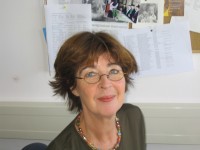Royal Decoration for Prof. C. Vlaskamp
On Friday 10 October 2014, Prof. C. Vlaskamp received a Royal Decoration on the recommendation of the University of Groningen. She was appointed Knight of the Order of the Netherlands Lion. Deputy Mayor of the municipality of Groningen Mr T. Schroor presented Prof. Vlaskamp with her decoration in the Academy Building, Broerstraat 5, Groningen.
Prof. C. Vlaskamp

Carla Vlaskamp (Sneek, 1949) has worked in the University of Groningen’s Department of Orthopedagogy since 1985. In 2001, she became professor by special appointment in the same department and a full professor in 2008. She is an expert in the field of children and young people with profound intellectual and multiple disabilities (PIMD). Her work has resulted in completely new insights into the way these children are cared for. Until the early 1980s, medical and nursing intervention was the main component of care for these seriously handicapped children, who seem unable to do anything for themselves and are totally dependent. The introduction of an education programme described by Vlaskamp in her 1993 thesis brought about a radical change for children with PIMD. It led to a move away from old trends and gave pedagogical intervention a significant role in work with these children. Upbringing, support, treatment and care of these children became leading principles in the Netherlands and abroad, having previously had people at a loss.
Prospects in life
The education programme begins with the idea that people with profound intellectual and multiple disabilities also have prospects in life, and can be helped by a scientifically grounded education programme. The creation of such an academic yet very practical programme, which offers the most dependent and vulnerable children in modern society the chance to give expression to their limited development opportunities, is Vlaskamp’s great achievement. She has impressively opened a door for children who live or lived in total isolation, shut away within themselves. She has liberated them to some extent.
Both nationally and internationally, Vlaskamp is considered to be one of the most knowledgeable academics in this area and is frequently requested to supervise or assess PhD projects at home and abroad. Her own international orientation (and language skills) help facilitate these contacts.
Research Centre on Profound and Multiple Disabilities
In 2009, Vlaskamp cofounded the Research Centre on Profound and Multiple Disabilities at the University of Groningen. The Research Centre aims to bring together and disseminate academic knowledge in close interaction with current practice in relation to people with profound multiple disabilities. The Research Centre concentrates particularly on two groups of people: those with very profound intellectual and multiple disabilities (VPIMD) and those with congenital or acquired deafblindness.
Vlaskamp has lectured students of Orthopedagogy throughout her years at the University. She was and is an enthusiastic and competent lecturer, always ready to listen to students and engage with relevant comments. For her, Orthopedagogy is not only an academic field, it is also a discipline closely related to actual practice which should be supported by thorough high-quality qualitative and quantitative research. That was and is the message she wants to spread, including in her teaching.
Contact with parents and carers
A point of particular interest in Vlaskamp's research programme is the position of parents and close carers in the care of children with very profound intellectual and multiple disabilities, and how satisfied they are with the care. In order to expand the knowledge gained in this way, she has been in extensive contact with parents, carers, supervisors, special educationalists, psychologists and doctors. She is a very welcome guest at parents’ associations and at study days at centres where these children are cared for. She ensures that no-one feels invisible. She is thus a remarkable person and an actively engaged professional, and she is greatly valued, especially by the parents of these vulnerable children.
As Full Professor of Orthopedagogy, Vlaskamp is a member of several boards, including the Executive Committee, the Educational Committee, the Research Committee and the Board of Examiners. Alongside these work-related positions, she has held a number of management positions on national and international levels, in the interests of children with PIMD. She has also been a member of many international organizations and boards, which has enabled her to expand her ideas abroad as well. Bearing in mind the motto ‘A good administrator keeps an eye on the future’, she has used these roles to ensure long-lasting attention for children and young people with PIMD.
Symposium and farewell lecture
To mark the retirement of Prof. C. Vlaskamp, the Department of Orthopedagogy organized a farewell symposium entitled ‘Sporen van de reiziger’ [‘Footprints of the Traveller’], on 10 October in Der Aa-kerk. Subsequently, Vlaskamp gave her farewell lecture in the Aula of the Academy Building. The lecture is entitled ‘Niet wat je ziet maar hoe je kijkt. Reizen met mensen met (zeer) ernstige verstandelijke en meervoudige beperkingen’ [‘Not what you see but how you look at it. Travelling with people with (very) profound intellectual and multiple disabilities’].
| Last modified: | 11 June 2024 08.50 a.m. |
More news
-
17 December 2024
Autism in women: masking takes its toll
Women with autism are often diagnosed later than men. Researcher Yvonne Groen developed a screening tool together with her colleagues to simplify the diagnosis.
-
26 November 2024
The fear of eating
Renate Neimeijer conducts research into eating disorders among children and young adults. Her current research focuses on ARFID: avoidant/restrictive food intake disorder.
-
05 November 2024
Do parents have any influence on whether their children wear 'pink' or 'grey' glasses?
How does a positive outlook actually develop? How important is upbringing in this regard? And what kind of role does optimism actually play in the daily lives of parents and children? Charlotte Vrijen is trying to find an answer to these questions....
